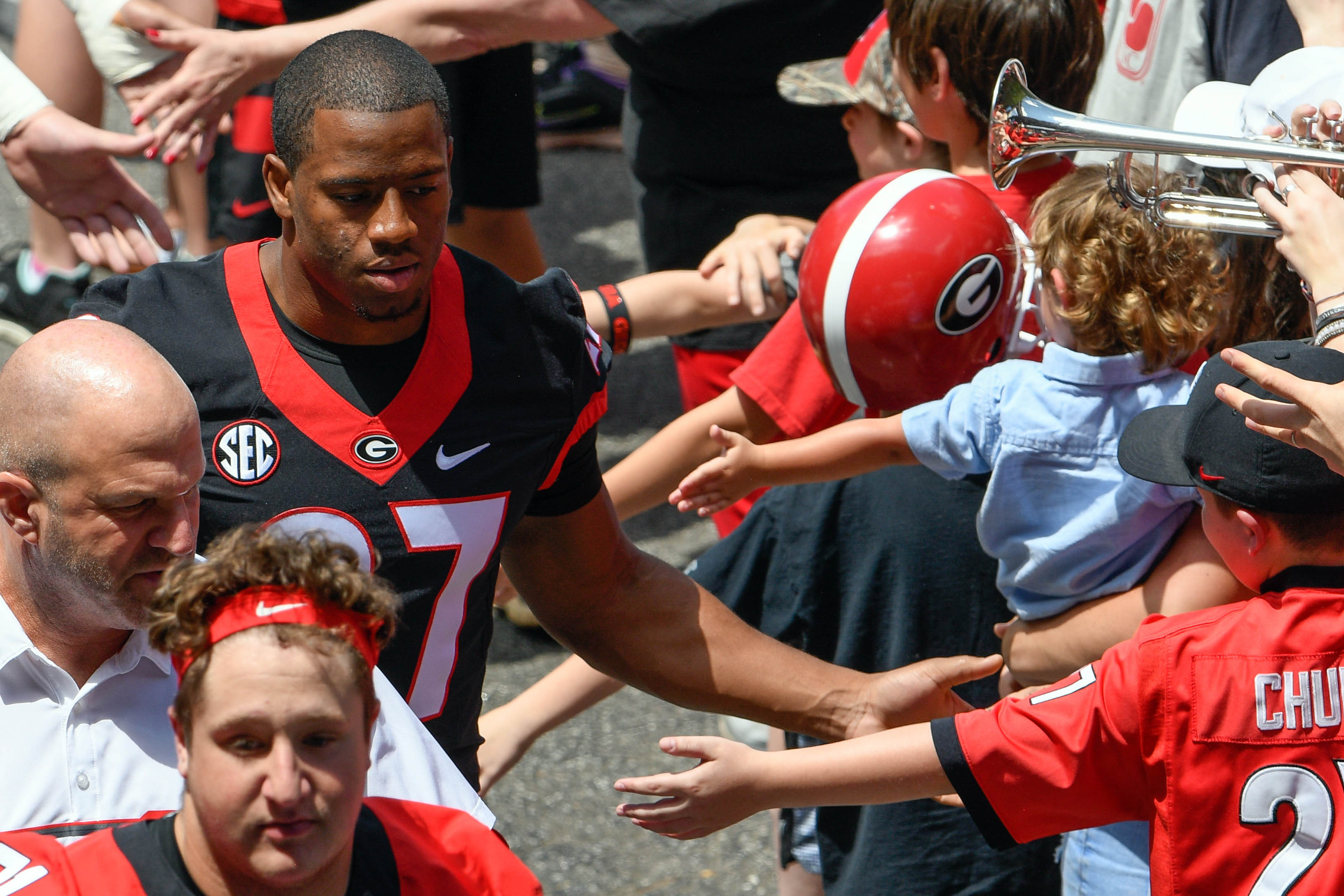
Georgia’s second G-Day Game under Kirby Smart culminated in a 25-22 victory by the Red Team over the Black Team.
Few teams played more first-time starters at key positions than the Bulldogs last season, which made this spring an important time to measure their progress. There were some notable standouts during the spring period and a few areas that could still prove troublesome.
There is plenty of talent on both sides of the ball for Smart and his staff to work with, but they will need greater consistency in 2017. If Georgia is able to maintain a high level of play for long stretches during games, it will be tough to beat.
The Bulldogs are likely to be a popular pick this fall to win the East and perhaps more; here are the team’s primary strengths and weaknesses heading into the summer.
Strengths
Running backs: As difficult as it might be to believe, this might be the deepest backfield that Georgia has had in recent memory. For a program that once had Todd Gurley, Keith Marshall, Nick Chubb and Sony Michel in the same meeting room, that’s saying something. The return of Chubb and Michel for their senior seasons immediately made running back the Bulldogs’ biggest strength.
Even in his first year back from a sinister injury, Chubb topped the 1,000-yard mark. If he is anything like the running back we saw as a true freshman, Georgia will be able to rely on its run game much more in 2017. Behind Chubb, the Bulldogs have Michel, another 1,000-yard rusher, and a slew of elite prospects in Brian Herrien, Elijah Holyfield and D’Andre Swift. Jacob Eason should have plenty of help this fall.
Linebackers: Georgia’s linebackers haven’t received much publicity, but they could form one of the best units in the SEC this season. Juniors Roquan Smith and Natrez Patrick steadily improved in their first full seasons as starters, and they are sure tacklers who possess tremendous instincts. Alongside Patrick and Smith with be seniors Lorenzo Carter and Davin Bellamy, who tied for the team lead with five sacks each last year.
It’s a versatile group that provides Smart and Mel Tucker with plenty of defensive flexibility. Behind the starters, don’t have much proven depth outside of Reggie Carter and D’Andre Walker. Georgia’s defense is expected to be one of the top groups in the SEC next season and the linebackers are a big reason why.
Secondary: There are certainly some caveats to this statistic, but the Bulldogs did not allow more than 189 passing yards to any team in their final seven games in 2016. Games against Georgia Tech and Auburn play into that stat, but it serves to highlight the improvement made by Georgia’s defensive backs in the second half of the season.
A good portion of Georgia’s secondary returns, including veteran safety Dominick Sanders. During his time with the Bulldogs, Sanders has become a reliable player in the defensive backfield who can make big plays happen. Returning alongside Sanders are Malkom Parrish, Deandre Baker and Aaron Davis. Several interesting newcomers will be in the mix as well, including Deangelo Gibbs, Richard LeCounte and transfer J.R. Reed.
Weaknesses
Offensive line: It’s no great secret that Georgia’s offensive line is the team’s biggest question mark entering the season. The Bulldogs weren’t able to generate much of a push up front last season and struggled to protect Eason. With three starters gone, there will be several new faces on the line this fall, which isn’t necessarily a bad thing.
Unfortunately, the early returns weren’t exactly promising. The projected starters surrendered five sacks in the G-Day Game, and the number could have been higher. Despite the rough outing, Smart defended his offensive line and won’t likely make drastic changes heading into fall practice.
Special teams: Rodrigo Blankenship remedied Georgia’s place-kicking woes last season, but he struggled to consistently put the ball into the end zone on kickoffs. That is just one of the aspects of the Bulldogs’ special teams that will need to improve this season. Punt and kickoff coverage was also a major issue in 2016, and Georgia must find a way to replace Isaiah McKenzie’s dynamic return ability.

Smart is placing a greater amount of focus on special teams this offseason, so it’s hard to imagine the Bulldogs having as many problems as last year, but there is still plenty of work to be done.
Pass rush: Although many believed wide receiver was a glaring weakness entering the spring, the G-Day Game provided reasons for optimism. Instead, the defensive pass rush is something that will need to be improved this fall.
15 of the Bulldogs’ 29 sacks came from three players – Trent Thompson, Carter and Bellamy. All three players will be back this season, provided Thompson returns to the team as expected, but Georgia must get more production from its young pass rushers to become the force that Smart wants.







